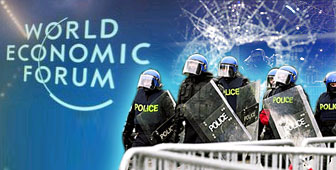Davos learns lessons from World Economic Forum summit

Canton Graubünden wants the annual World Economic Forum (WEF) summit to continue to be held in the resort of Davos, despite violent clashes with anti-globalisation protesters last January. But the authorities backed a report saying the WEF should do more to encourage debate with its opponents.
A report commissioned by the cantonal authorities recommends that anti-globalisation groups should be allowed more involvement, and that police should exercise more restraint in curbing protests.
The authors of the report, published on Thursday in the cantonal capital, Chur, said protests were inevitable at WEF meetings, given that the organisation had chosen “globalisation” as its guiding theme and couldn’t escape “the host of potentially inflammatory issues” associated with the term.
The 70-page report, drawn up by Peter Arbenz, a veteran federal politician and trouble-shooter, recommends a dual strategy – a more proportionate use of police force, and an improved dialogue between the WEF and its critics under the banner of what should become the “spirit of Davos”.
“Spirit of Davos”
The authors say the “spirit of Davos” is aimed at allowing an honest debate, including “hard confrontations”, but one where both sides accept a common set of rules.
The report concludes that to foster the new “spirit of Davos”, the WEF should stop trying to incorporate the views of its opponents – non-governmental organisations (NGOs) – into its own programme.
“A muddle of the principles held dear by the WEF and of those from [critical] grass-roots organisations is not helpful,” it says.
Instead, both sides should establish organisational structures designed to give room to a more focused debate on the various issues dividing them.
Such a scenario, in which the WEF would resemble a “playing field” rather than a “bunker”, would make Davos “a place for a peaceful, but at the same time intensively critical debate between the WEF and its critics”.
As an interim measure to reduce tensions in the run-up to the next gathering in January 2002, the WEF should seek “an increased level of transparency… and a reduction of mechanisms designed to exclude [critics].”
Political cost
The report, which is to be debated by the parliament of canton Graubünden in November, is critical of the controversial security measures taken by police and special army units at the last WEF gathering earlier this year.
While preventing the meeting from being disrupted, “the cost in terms of restrictions and effort was high, perhaps too high if seen from a political perspective”.
As a remedy, the report recommends action to distinguish legitimate WEF critics from violent rioters.
Police should allow demonstrations to take place in Davos as a “safety valve” for dissent, it says. Meetings such as the “Public Eye” conference of critical NGOs should also be incorporated into the security arrangements in consultation with their organisers.
At the same time, preventive action based on a more efficient gathering of intelligence should be taken “to detect violent activists and prevent them from travelling to Davos”.
The dual police strategy – soft on critics but hard on rioters – needed careful training, preparation and sufficient manpower, including army units, the report concludes.
by Markus Haefliger

In compliance with the JTI standards
More: SWI swissinfo.ch certified by the Journalism Trust Initiative
You can find an overview of ongoing debates with our journalists here . Please join us!
If you want to start a conversation about a topic raised in this article or want to report factual errors, email us at english@swissinfo.ch.